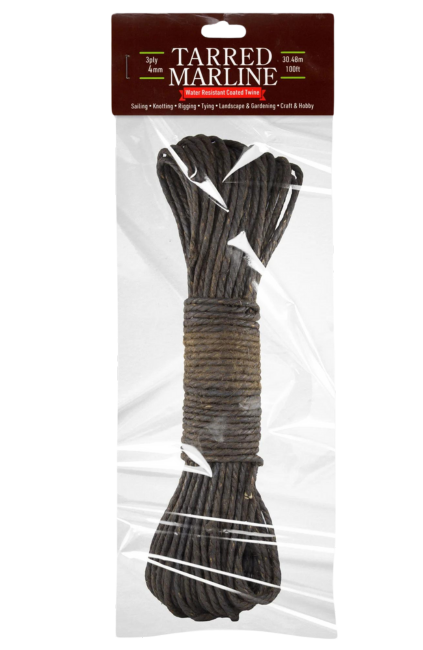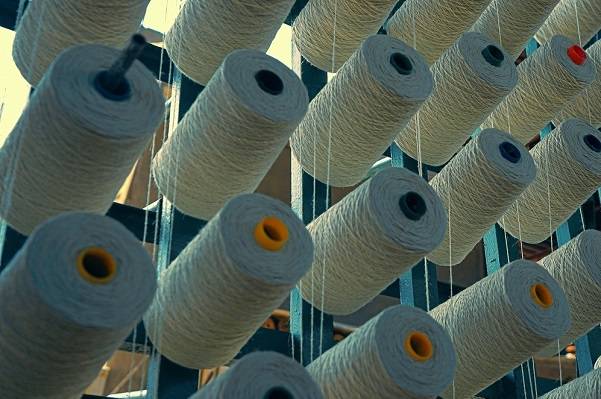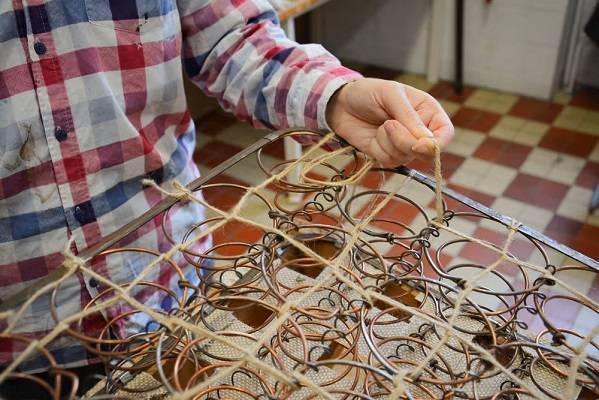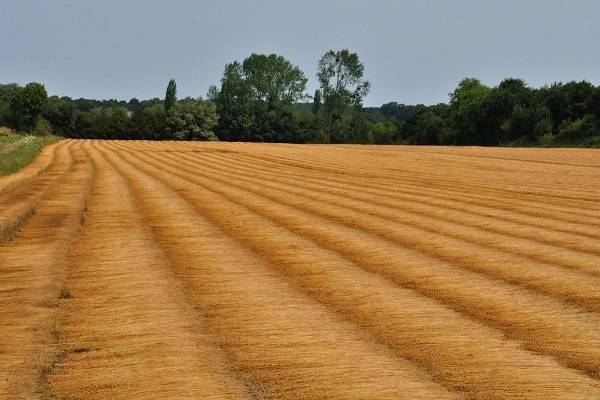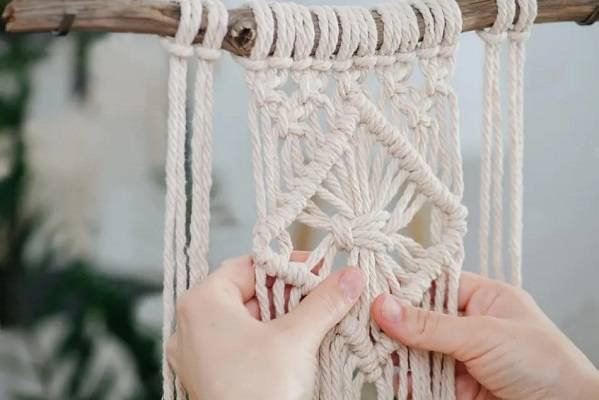Tarred Marline: Durable Coated Twine for Crafting, Boating, Gardening, & Other Favorite Activities
Discover the versatility of tarred marline, the all-purpose twine that's perfect for your next project. From providing UV protection to enhancing grip, and with its eco-friendly properties, tarred marline is a reliable choice for a wide range of applications.

Innovation & Quality
Developing and supplying premium-quality, sustainably grown, consumer products
100% Natural
Organically Grown and Ethically Sourced
hemp and other natural fiber products
Shipping
We offer fast shipping
Your order out within 1-3 days
Wholesale
Visit our wholesale portal to register or login to your account
Tarred marline is an essential tool for every passionate model ship maker, mariner, landscaper, gardener, or anyone doing arts & crafts. From whipping wire splices and mooring posts to gardening and DIY outdoor projects, tarred twine is an all-purpose accessory with exceptional properties. However, with so many different brands on the market, it is not easy to find exactly what you are looking for. For this reason, we have compiled important information that will help you determine whether twine treated with tar is the right choice for you.
Buy Tarred Marline and Premium Linen Twine Supplies At Hemptique
Hemptique is top-rated manufacturer of naturally sourced products for all your DIY project needs. Our newest collection features products made of premium Egyptian flax linen that caters to individuals, businesses, workshops, retailers, hobby sailors, small boat owners, model ship makers, crafters. Our assortment includes a large selection of linen-based supplies, such as cords, twine, and thread. New from Hemptique, a 3ply tarred marline is manufactured from 100% linen yarn and then treated with tar. Durable and water-resistant, it is perfect for sailing, rigging, tying, gardening, crafts & hobbies, knotting, landscaping, and other outdoor uses. Design to meet the highest durability standards,
Hemptique’s tarred marline can enhance your project with functionality, aesthetic appeal, and strength. For more information on the product, feel free to contact us at (760) 602-4864, ext. 402 & 405, or fill out a quick online form to apply for a wholesale account.
Hemptique’s tarred marline can enhance your project with functionality, aesthetic appeal, and strength. For more information on the product, feel free to contact us at (760) 602-4864, ext. 402 & 405, or fill out a quick online form to apply for a wholesale account.
What Is Tarred Marline?
Tarred marline is twine made of natural fibers, which are later treated with tar. Typically, it is made of plants like hemp or flax, but can be made of various materials. The purpose of the tar treatment is to improve fiber’s durability, water repellence, and total strength. Furthermore, administering tar gives twine an extra layer of protection from rot, mildew, and UV damage, thus, making it ideal for outdoor and maritime applications. This is because the tar conserves the fibers and enhances the grip, which makes it easy to hold the boating knots tight and secure in place. Tarred marline rope is natural, dark brown color and has a slightly sticky texture, because it is treated with sticky, viscous liquid.
Tarred Marline Through History
The origins of tarred marline twine go back centuries. This tradition stems from the Age of Sail - a period of international supremacy of sailing ships in commerce and war conflicts. This dominance of sailing ships lasted approximately from the 16th century to the 19th century, when people started treating cords for maritime applications with tar. At the time, a type of small-diameter twine called ‘marline’ was used on ships to carry out "marling". A technique known as “marling” mainly served for two purposes:
- to bind and seal ropes’ ends to prevent them from fraying
- to wrap and seal components of the ship’s rigging and sails to safeguard them from untying, unraveling or loosening.
Tar was used on naval cordage as a preservative. It provided strong protection against harsh marine conditions, including salt water, wind, and sun exposure. At the time, tarring natural fibers was a ground-breaking innovation for both fishing and naval vessels, which depended on resistant and durable materials to ensure maximum safety and effectiveness at sea. Although its applications have evolved in the course of time, its primary usage is still in seafaring, due to its exceptional functionality.
Types of Tar
Tar is a sticky viscous liquid that contains hydrocarbons or free carbon. It is acquired from various materials by destructive distillation. This type of processing involves the heating of organic materials until dark brown or black tar drips away. Obtaining wooden tar has been known for ages and has mostly been used for preserving wooden sailing vessels.
- Wood
- Peat
It can also be derived from coal and petroleum; however, these types are considered toxic.
Discovering The Benefits & Major Properties of Tarred Marline
Throughout history, tarred twine has been widely used for various purposes due to its consistency, versatility and surprisingly large number of advantages.
Durability & strength
The number one benefit is increased strength and durability. When a protective layer of tar is administered to natural fibers, it safeguards them from moisture and rot and enhances their strength. At the same time, it extends the life cycle of the fiber under physical tension and when exposed to harsh environmental conditions. Therefore, tarred marline rope is suitable robust choice even for the heavy-duty utilization in various environments.
Water, mold, & mildew resistance
Twine coated with tar is highly resistant to moisture. This is because tar repels water by sealing the fibers and prevents them from absorbing the water, rotting, or becoming moldy. This is especially important in moist or wet conditions (maritime and outdoor environments), where untreated cordage can deteriorate heavily. Resistance to moisture prolongs the lifespan of marline in wet surroundings by preserving its integrity and efficiency over time.
UV-rays resistance
When it comes to ultraviolet light, tar coating protects the twine from the degrading effects of UV-rays. Constant exposure to such light can degenerate natural fibers’ quality, but the protective tar layer safeguards them from direct Sun exposure and from becoming fragile or damaged. In turn, the cord maintains its strength and doesn’t turn brittle or degraded.
Enhanced grip
Tarred marline has exceptional grip, which is an essential characteristic for a lot of its usages. The slightly sticky feel makes it easier to manage and enables the knots to hold more solidly. In crafting with rope or nautical applications this is extremely important, especially where reliable knots may be critical for safety.
Biodegradability
Despite its robust tar coating, natural fiber marline made of plants like hemp or flax remain environmentally considerate. This is a substantial environment-friendly attribute, since it guarantees that the material will naturally degrade over time, without leaving harmful residues, waste and pollution. For this reason, tarred marline is a favorable choice of eco-conscious individuals and businesses, who prioritize sustainability as well as functionality.
Where It’s Used: A Variety of Different Applications
Tarred marline twine is used in a wide range of different areas, from recreational activities and DIY projects to industrial use and landscaping. Below, we have compiled a list of most important applications:
- Maritime uses - Historically used for rigging smaller boats, tarred twine secures knots such as the bowline or clove hitch even in wet surroundings, making it an essential tool for enthusiasts with passion for boating, sailing, recreational fishing, and other water sports and activities. It can be utilized for seizing and serving standing and running rigging on vessels, knot tying, securing sails, tying ratlines and hanks, etc.
- DIY crafts & hobbies – Marline covered with tar is perfect supply for a wide range of DIY projects to add a vintage touch. Use it to embellish handmade greeting cards or to bind the spine of DIY journals to create an enhanced rustic look and an overall appeal while maintaining strength and longevity. You can also use it for model ship making, home improvements, decorative items, macrame, outdoor macrame projects (pot holders, DIY bird houses, macrame hanging lanterns, etc.)
- Gardening & landscaping - Tarred twine is perfect for your gardening or landscaping projects because it is highly durable and resistant to different weather conditions. You can use it to tie tomato plants or beans to stakes or make trellises for climbing roses, peas, or vines. Mark rows in the garden, secure branches in the backyard, or use this all-purpose cord for general tying in the garden.
- Gear Repair – If you plan on going camping or fishing, make sure you bring tarred marline with you. It is an ideal cordage for emergency repairs on camping trips. It can be used to mend tent poles, fasten backpack straps, or repair broken equipment.
- Industrial Use – Another fantastic application is in warehouses. Tarred twine can be used to bundle pipes or lumber and enable secure handling in environments where other types of ropes might fail.

Materials Used To Make Tarred Twine
The performance of marline depends to a large extent on the materials it’s made from. Because of this, knowing the properties of these materials helps us understand their functionality, environmental effects, and diverse applications.
Primary Material - Linen Twine
Exceptionally durable tarred marline can be made of linen twine, which is developed from the fibers of the flax plant. The reason why linen is selected is due to its extraordinary strength, longevity, and resistance to bacteria and mold. Flax fibers are famous for their remarkable tensile strength, allowing them to endure strong pulling forces without breaking. This is why linen is a perfect base material for marline. It performs well under tension and is suitable for use in maritime setting.
Tar Coating
The other component that is just as important is the tar itself, which is applied to the linen twine surface. Historically, people used natural pine tar as a top layer due to its natural resistance to rot, mold, mildew, and UV rays. Nowadays, tar coating is usually made by blending natural and synthetic elements. This compound has been developed to increase protection while reducing environmental impact. The tar serves as a durable, protective sealant that repels water and prevents microorganism growth, which is especially beneficial in moist environments.
Earth-Friendly Materials
Linen twine and tar are considered eco-friendly materials, since linen is derived from flax plants that don’t require a lot of natural resources (water) or pesticides for cultivation. Therefore, tarred marline rope is beneficial for our environment, unlike its synthetic or cotton alternatives, which rely heavily on irrigation and chemicals, thus, leaving heavy carbon footprint.
All-purpose product
Tarred marline twine is not only strong and protective, but it also has multiple uses. It is suitable for a wide array of traditional and innovative uses, from historical ship rigging to contemporary outdoor DIY projects or gardening applications. It is also highly valued in circumstances where eco-consciousness is prioritized.
Linen Twine vs. Other Materials
When it comes to linen twine alternatives, there are a few materials that come into consideration, and they include cotton, polyester, and hemp. Each of these materials has its own advantages and disadvantages depending on how they are used, but when we talk about tarred marline specifically, linen stands out due to its superior qualities.
| Material | Strength | Durability in Wet Conditions | Environmental Impact | Cost | Suitability for Tarred Marline |
|---|---|---|---|---|---|
| Linen | High | Excellent | Low | Moderate | Best |
| Cotton | Moderate | Poor | Moderate | Low | Fair |
| Polyester | High | Good | High | Low | Good |
| Hemp | High | Good | Low | Moderate | Very Good |
Linen
- Strength - Flax plant fibers are very strong and resistant to breaking and stretching.
- Durability in wet conditions - Linen is highly durable in outdoor and maritime environments, due to its natural resistance to rot and mildew, which are even more enhanced when treated with tar.
- Environmental impact – Twine made of flax plant is ecofriendly material that requires less pesticides and water than conventional cotton for example.
- Cost – The price is usually higher than synthetic or cotton material, however, you get the most value for the price.
- Suitability for tarred marline - Linen is the best choice because of natural strength and moisture resistance that ensure long-lasting life cycle and enhanced functionality, while remaining green and not harming our planet.
Cotton
- Strength – Cotton is not as strong as linen twine, which makes its fibers more sensitive to breaking under stress.
- Durability in wet conditions - Cotton is known to absorb water, which means that it is susceptible to rotting and mildewing if not treated.
- Environmental impact – Unless organically grown, the cultivation of cotton is resource-intensive, which leaves a significant carbon footprint.
- Cost – Typically, cotton is budget-friendly material.
- Suitability for tarred marline - Due to lower durability in moist environments, cotton is less suitable for marline making.
Polyester
- Strength - Synthetic fibers are remarkably strong and do not stretch easily.
- Durability in wet conditions - Polyester is water-resistant material that does not degrade when exposed to wet conditions.
- Environmental impact - Polyester is not biodegradable, and its manufacturing is energy-intensive, thus, making it the least environmentally friendly option.
- Cost – Polyester typically has lower price point than other natural materials.
- Suitability for tarred marline - Although very strong and durable, due to its high environmental impact, polyester is considered a less ideal choice.
Hemp
- Strength – Hemp is similar to linen in its strength and durability properties.
- Durability in wet conditions – Hemp fiber performs exceedingly well in wet conditions since they have natural resistance to mold, mildew, and rot.
- Environmental impact - Hemp is a biodegradable and sustainable plant that can be cultivated with minimal or no chemicals at all. Furthermore, it replenishes the soil and prevents its erosion.
- Cost – Hemp price is usually comparable or slightly cheaper than linen.
- Suitability for tarred marline - Hemp is an excellent material for tarred marline as it can withstand a lot of tension and prolonged use without deteriorating. Because of its sustainability, hemp is a great contender.
How To Choose Tarred Marline Twine for Your Project
Knowing which tarred marline to use for your DIY craft project goes beyond just picking any twine off the shelf. To be able to choose the perfect marline that will last you a long time, you have to review several different factors before you make a purchase. Let’s take a closer look at various aspects to consider when looking for an ideal marline:
Project requirements evaluation
- Strength and Durability: Start with assessing the load the twine will have to handle. For instance, if you are working on a project such as outdoor garden structure, choose marline that is known for its superb tensile strength and robustness - linen tarred marline.
- Exposure to various elements: If you are working on an outdoor decor piece or an accessory for your boat, make sure you opt for a marline with excellent water and weather resistance, such as hemp, polyester, or linen.
Choose high-quality products
- Known manufacturers: Always buy products from respectable manufacturers and suppliers. High-quality tarred marline has an invariable tar coating, consistent thickness, and end even texture, without defects.
- Read client feedback: Read reviews from previous customers or ask for recommendations from other hobbyists. Their feedback may offer you essential insights into how certain type of marline would suit your project.
Value for the money
- Cost vs. Quality: Although it is often tempting to buy cheaper products, investing in high-quality tarred marline has a long-term value.

Consider eco-friendly alternatives
- Material: Whenever you can, try to select tarred marline twine, which is made from natural, sustainable materials like linen or hemp, and keep away from synthetics.
- Biodegradability: If you are an eco-conscious crafter, you will also consider end life of the materials used. Natural tarred marline offers the advantage of leaving less environmental impact. Unlike synthetic fibers, natural fibers like hemp or linen are eco-friendly options.
Think of material’s aesthetic appeal
- Texture and Color: Tarred marline has a distinctive rustic look and a dark brown color. Think of how its texture and color will fit into the overall aesthetic of your craft.
- Flexibility: Consider how flexible the twine should be, as tar treatment might make certain materials less flexible.
Recommended Product: Linen Tarred Marline Twine Hemptique
If you are looking for high-quality, reliable tarred twine, Hemptique has an excellent product. Our tarred linen twine offers al the traditional benefits of coated marline with modern improvements to meet the needs of contemporary consumers.
- Robust composition: Designed to tolerate even the most challenging settings, it has a long life cycle and reliability.
- Versatile applications: Highly suitable for a broad spectrum of uses, from industrial to artistic.
- Aesthetic appeal: Tarred marline has a rustic, rugged look that can enhance the look of any project you are working on.
Final Thoughts
From its historical origins to its present-day utilization, tarred marline stands as an authentic source of durability and versatility. Whether you are a professional sailor, an avid boat captain, or a passionate crafter, operating with top-quality supplies, such as tarred marline, guarantees strength, eco-awareness, aesthetics, remarkable properties, and great value for the money. By thoroughly taking into account these elements, you will be able to choose marline that meets your requirements, crafting style, and budget.


